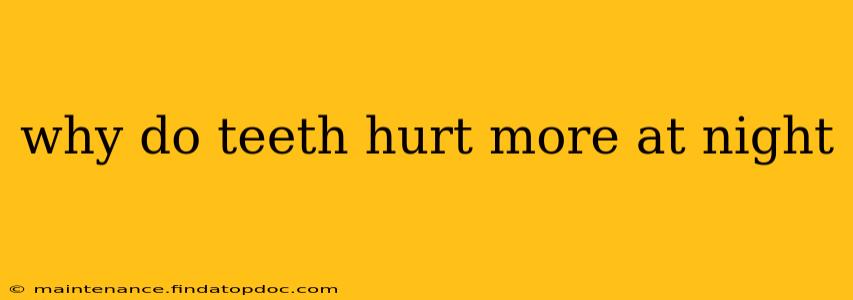Tooth pain is never fun, but the amplified agony that often strikes at night can be particularly frustrating. Why does this happen? The increased sensitivity at night isn't due to a magical nighttime amplification of pain signals, but rather a confluence of factors that combine to make existing tooth problems feel significantly worse when you're trying to sleep.
What Causes Nighttime Tooth Pain?
Several reasons contribute to the intensified toothache experience at night:
1. Reduced Distractions: During the day, we're busy. Work, errands, social interactions – all these activities distract us from minor aches and pains. At night, with the quiet and stillness, those sensations become far more pronounced and noticeable. Essentially, your brain isn't occupied with other stimuli, leaving the tooth pain more prominent in your awareness.
2. Changes in Body Position and Blood Flow: Lying down can alter blood flow to the head and neck, potentially increasing pressure on sensitive teeth and inflamed tissues. This increased pressure can exacerbate the pain. Gravity plays a role here; during the day, gravity helps to drain fluids away from the area, but at night, this effect is lessened.
3. Swallowing and Salivary Gland Activity: Our salivary glands produce less saliva at night. Saliva acts as a natural buffer and cleanser for our mouths, helping neutralize acids and wash away food particles that can irritate sensitive teeth or gums. Reduced saliva flow means less protection against irritating substances and a potentially heightened sensitivity to pain.
4. Inflammation and Swelling: If you have an infection or inflammation in or around a tooth (like an abscess or gum disease), this inflammation can worsen at night. Swelling can increase pressure on nerve endings, leading to amplified pain. Lying down can also cause fluids to accumulate in the affected area, further intensifying the swelling and, therefore, the pain.
5. Bruxism (Teeth Grinding): Many people grind their teeth unconsciously, particularly at night. Bruxism can wear down tooth enamel, expose the dentin (the layer beneath the enamel, rich in nerve endings), and cause significant pain, especially when the grinding occurs for extended periods during sleep.
How to Manage Nighttime Tooth Pain
While the underlying cause needs professional dental attention, managing the pain at night can improve your sleep quality. Some temporary relief options include:
- Over-the-counter pain relievers: Ibuprofen or acetaminophen can help manage pain until you can see a dentist.
- Cold compresses: Applying a cold compress to your cheek can help numb the area and reduce inflammation.
- Elevating your head: Use extra pillows to keep your head elevated. This can help reduce swelling and pressure on your teeth.
- Saltwater rinse: Gently rinsing your mouth with warm salt water can help soothe irritated gums.
It's crucial to remember: This information is for general knowledge and should not replace professional dental advice. If you experience persistent or severe tooth pain, especially nighttime pain, you should consult a dentist as soon as possible to identify and treat the underlying cause. Delaying treatment can lead to more serious complications.
People Also Ask (PAA) Questions & Answers
Q: Why does my tooth hurt more when I lie down?
A: Lying down can alter blood flow to your head and neck, potentially increasing pressure on sensitive teeth and inflamed areas. Gravity plays a role; lying down reduces the draining effect of gravity on fluids around the tooth, potentially increasing swelling and pressure.
Q: Why does my wisdom tooth hurt more at night?
A: Wisdom teeth are prone to impaction and infection, causing inflammation and increased pain. The same factors that worsen nighttime tooth pain in general – reduced distractions, changes in blood flow, decreased saliva, and increased swelling – will amplify the discomfort associated with impacted or infected wisdom teeth.
Q: Why does my tooth hurt worse at night than during the day?
A: The reduced distractions, altered body position, changes in blood flow, decreased saliva production, and the potential worsening of inflammation and swelling during sleep all contribute to making existing tooth problems feel far worse at night.
Q: What can I do to stop my tooth from hurting at night?
A: While over-the-counter pain relievers and cold compresses can offer temporary relief, the most effective solution is to address the underlying cause of the pain by visiting a dentist. They can diagnose the problem (cavity, abscess, gum disease, etc.) and provide the appropriate treatment.
By understanding the reasons behind nighttime tooth pain intensification, you can take steps to manage the discomfort and seek professional help when needed. Remember, timely dental care is essential for preventing further complications.
